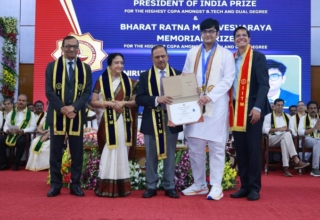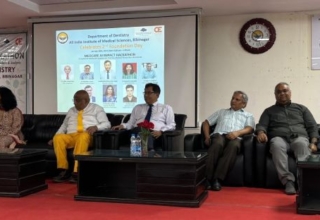
The judgment, which was initially welcomed by most of the political parties, was also politicized quickly as a criticism offered caste appeal. At the same time, the judgment did ignite an insightful and right kind of debate on reservation policy and affirmative action after a long time in India says Autar Nehru
In a landmark judgment, the Supreme Court of India by a majority 3:2 verdict on November 7, 2022 upheld the 103rd Constitutional Amendment, 2019, under which the Government has introduced 10 percent vertical reservation in government jobs and admissions in higher educational institutions (HEIs) for Economically Weaker Sections (EWS) among the general category from 2019.
The constitution bench of five judges which included the then Chief Justice of India U U Lalit and Justices S. Ravindra Bhat, Dinesh Maheshwari, Bela M. Trivedi and J B Pardiwala delivered the ruling on a petition filed by Janhit Abhiyan and 39 others on the amendment. By validating the amendment, the apex court, has in effect shifted reservation criteria from caste and class to income, community and individual—a signature departure from its past jurisprudence which now recognizes poverty as deprivation and a case for affirmative action. That the EWS is already well-established in law through the provisions of the Right to Education Act, 2009, which provides for 25% reservation for children from poor families of the neighbourhood, was also cited by one of the concurring judges, also supports the new thinking. “Inequalities in participation in higher education by gender and by caste have narrowed down to a great extent. But inequalities between the richest and the poorest sections in higher education have been very high, and more importantly they have been widening over the years, as analysis of data from several rounds of national sample survey reveals. Hence the reservation policy for economically weaker sections is indeed a welcome one. Eventually, the EWS reservation system may better replace the other types of reservation; and in the long run, I wish, there will be no need for any kind of reservations in higher education,” says Jandhyala B G Tilak, Former Professor & Vice Chancellor, National Institute of Educational Planning and Administration.
By allowing EWS reservation in excess of the 49.5 percent (SCs: 15%, STs: 7.5% & OBC: 27%) threshold limit it had set in the Indra Sawhney case judgment of 1992 on OBC reservation, the Supreme Court has also held that this limit is not inflexible.
While the fall out of this historic judgment is being intensely debated and in particular political parties who have thrived on caste-based politics are taking a critical view of the new EWS reservation not being made horizontal to include everyone, the new reality is the narrative on reservation and affirmative action has been almost inversed now.
The ruling BJP regime which rushed this amendment in January 2019 to provide reservation solely on economic criteria to sections other than those enjoying reservation barely a few months before the general elections of 2019 to dole out 10% EWS reservation is feeling vindicated. Education Minister Dharmendra Pradhan welcomed the judgment by tweeting, “Constitutional validity to 10% quota for EWS will open up new doors of opportunities for the economically weaker sections, especially in admission to HEIs and central govt. jobs, further strengthen social justice as well as the spirit of “Sabka Sath and Sabka Vikas.”
It is pertinent to mention that the 103rd Amendment has inserted clauses in the Article 15 (6) and Article 16 (6) of the Constitution to enable EWS reservation. The clause in Article 15 with respect to admission reservation in HEIs says, “ any special provision for the advancement of any economically weaker sections of citizens other than the classes mentioned in clauses (4) and (5) in so far as such special provisions relate to their admission to educational institutions including private educational institutions, whether aided or unaided by the State, other than the minority educational institutions referred to in clause (1) of article 30, which in the case of reservation would be in addition to the existing reservations and subject to a maximum of ten per cent of the total seats in each category.”
Back in 2019, to accommodate 10% reservation, the union government had approved the creation of 214,766 additional seats in central educational institutions so that respective quotas for other categories are not affected, and also earmarked a budget of ₹4,315 crore for implementation. However, because of the closure of educational institutions due to covid pandemic in 2020 and 2021 coupled with less awareness among students and parents, public universities and colleges didn’t feel much heat of the impact of implementation. Now it will be felt from this year onwards and will require both more infrastructure and more faculty members.
“Since EWS reservation is additional, without affecting other reservations, obviously it requires huge amount of resources for creating additional infrastructure, and also for recruiting additional teachers. That the present level of funding of higher education is not adequate, one can say that at least 10% real increase in grants would be required to implement the policy and maintain status quo,” adds Prof Tilak, an authority on education planning.
The EWS reservation will of course have more challenges, first and foremost being the lack of scientific data and criteria to determine the economically weaker sections of forward castes and a clamor for a judicial review besides implementational challenges on ground. The reservation as a concept cannot be ruled out for private universities as state is now empowered to do that. However, there is no immediate calling, so private universities and their representatives are largely staying out of this debate. “Silence is the best policy, why to get into something controversial. We will adhere to what will be told to us and wherever we feel wronged, we’ll raise voice in appropriate forum,” said an official of EPSI (Education Promotion Society for India, an apex association of private universities in India) on condition of anonymity.
So, stay tuned for the action and reaction!










